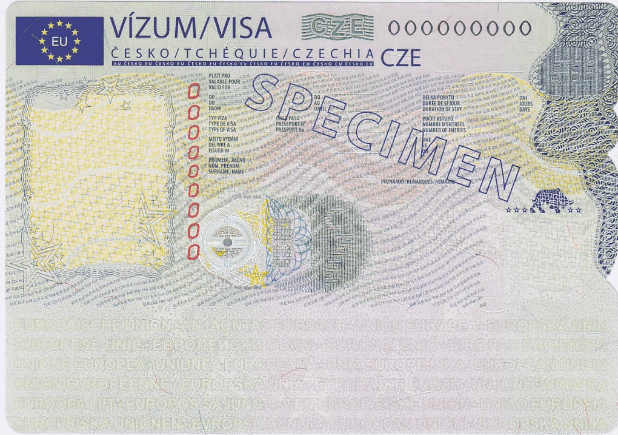Our Quick Guide to the Czech Visa Process
If you’re a non-EU citizen moving to the Czech Republic to find self-employment, you probably have heard that you will need to acquire a long term visa. This type of visa is very common for people moving to the Czech Republic, but it can be quite confusing for people who aren’t familiar with the application process.
Zivno Visa vs Digital Nomad Visa
The digital nomad visa in the Czech Republic is for freelancers in IT and marketing. It offers a faster and simpler process than the regular Zivno visa. Check our other article to see if you qualify.
Is it called a Czech Zivno visa or Czech Freelancer visa?
The long-term visa is commonly referred to as a Czech freelancer visa or Zivno visa. Typically, before you apply for your long-term visa, you apply for and receive your work permit. In Czech, this work permit is called a Zivnotensky list, hence the name “Zivno visa.” Both of these terms, freelance visa, and Zivno visa, mean the same thing.
The official, legal name is a Czech long-term business visa, and the purpose of stay is classified as “business.” This means that you are living in the Czech Republic to work on a freelance basis and have a freelance work permit, which is also known as a Zivno.
The Zivno visa is very common for TEFL trainees and English teachers from the US and other countries. Having this type of visa means that you invoice your employers each month, and are not a full-time employee for one company.
These are the official steps to get a Czech freelance (zivno) business visa as a foreigner:
Step 1 – Embassy Appointment and Local Clients
Before applying for the Czech freelance (zivno) visa, there are two things you should always check first:
1. Embassy Appointment
Before you start the zivno visa process, check if the Czech embassy in your home country or the country where you are officially residing offers appointment slots for a freelance visa with the purpose of entrepreneurship in the Czech Republic.
You can apply at:
The Czech embassy in your country of citizenship, or
The Czech embassy where you currently reside legally.
However, some nationalities are allowed to apply at any Czech embassy, including the one in Dresden, Germany. You can check the official list of exceptions here.
2. Local Clients
The Czech embassy will want to confirm that, if they approve your visa, you will actually work in the local Czech market.
The purpose of the zivno visa is to run your business in the Czech Republic — not to work for foreign clients remotely. If you don’t have Czech clients, you are not fulfilling the official purpose of stay. That’s why it’s highly recommended to:
Have at least two local clients, and
Ask each to issue a Letter of Interest for future cooperation.
Your local client should confirm in the letter that once you receive your visa and activate your trade license, they are willing to cooperate with you.
Pexpats strongly recommends getting letters from two or more Czech companies. If you submit only one letter, the embassy may treat your case as employment and suggest applying for an employee card (work visa) instead.
You can download the template for the Letter of Future Cooperation here.
The Czech embassy will contact your clients directly to confirm they’re willing to work with you. This is a standard part of the visa approval process.
Note: If you later apply for extension of your freelance residence permit, you do not need to submit new Letters of Interest again.
Step 2 – Trade License Registration
After checking the local market and confirming cooperation from Czech companies, and once you know you can get a visa appointment, you can register your Czech trade license at any local Trade License Office (Živnostenský úřad).
This is the license required for applying for the freelance (zivno) visa.
Documents needed for trade license registration:
Your passport,
Your business address consent form,
Criminal clearance report from your home country of citizenship (or affidavit for US citizens only).
The criminal clearance report must:
Be translated into Czech,
Be no older than 3 months on the day of the trade license registration,
In most cases, be legalized with an apostille.
You can check the official list of countries exempt from apostille requirements here.
If you're not sure, it is safer to arrange an apostille anyway to avoid visa processing delays or rejection.
Important: Do not leave your criminal clearance report (or affidavit) at the Trade License Office. Ask them to return it after registration. You will need the original document again when applying for your visa in the next step.
How the Czech trade license works if you don’t have a visa yet:
The trade license you receive is not fully active until your visa is approved. It’s a two-step process:
1. Initial registration
Foreigners without a visa can still register for the trade license,
But it is not activated until the visa is granted,
You receive a trade license without a tax ID or business registration number,
You have 180 days from registration to get your visa approved.
Note: You cannot legally invoice clients or perform freelance work until your trade license is activated.
2. Activation after visa approval
Once your visa is approved and you collect it, you must submit a copy of your visa to the Trade License Office within 3 working days.
After this step, your zivno is activated.
You can now legally start your freelance work and invoice Czech clients.
Step 3 – Visa Appointment at the Embassy
After registering your Czech trade license, you can contact the Czech embassy to schedule your visa appointment. This is where you submit your application for the freelance (zivno) visa.
Required documents for the visa application:
Passport (valid for at least 180 days),
2 passport-size photos (3.5 x 4.5 cm, white background),
Completed visa application form,
The original trade license from Step 2,
Proof of accommodation in the Czech Republic,
Visa application fee (embassy will confirm),
Proof of funds: A bank certificate showing a balance of at least 156,500 CZK (approximately 7,500 USD),
Criminal clearance report:
Use the same document from Step 2,
It must be apostilled and translated into Czech,
For US citizens, an affidavit is accepted instead of a criminal record.
Important: If you’ve lived in another country for 6+ months in the past 3 years, you must also provide a criminal clearance report from that country, with Czech translation.
Check if this document also needs an apostille. If you’re not sure, it’s safer to arrange one in advance — the Czech embassy may ask for the apostilled version later, which can delay your application.
Supporting documents:
Letters of Interest from Czech companies confirming that, if your visa is approved, they are interested in working with you,
Diplomas, certificates, or other documents confirming your professional qualifications.
How long is the visa valid?
The first zivno visa can be issued for up to 365 days, which is the maximum legal duration for this visa.
However, your visa may be issued for a shorter period depending on the length of your accommodation contract.
If you want your visa to be issued for the full 12 months, make sure to provide proof of accommodation with no end date, or at least one that covers the entire visa period.
Step 4 – Visa Approval
The official deadline for Czech freelance (zivno) visa approval for the purpose of business is 90 days from the date of your visa application.
Once your visa is approved, the Czech embassy will contact you for visa collection. Some embassies may allow collection by post, but you must confirm this directly with the embassy.
Health Insurance Requirement
Before collecting your visa, you must submit proof of full-year health insurance. The insurance must be comprehensive and meet Czech visa conditions. If needed, we can help arrange your health insurance online.
Important: If you are a citizen of the USA, UK, Israel, Japan, Serbia, Bosnia and Herzegovina, or Turkey, you must register for Czech public health insurance after arriving. This is a legal requirement.
You should not buy commercial health insurance for the full year,
Instead, fill out the affidavit provided by the Czech embassy,
Then register for public health insurance once in the Czech Republic.
The embassy might still ask you to show private health insurance for the first two months, just to ensure you're covered until public health coverage begins.
Step 5 – Moving to the Czech Republic
Once you arrive in the Czech Republic on your freelance (zivno) visa, you must complete several required steps to activate your business and legal stay.
Register with the Foreign Police
You must register your stay within 3 working days of arrival at the Foreign Police Office.
You should bring:
Completed registration form with your Czech address,
Proof of health insurance,
Passport with visa.
Activate Your Trade License
After the foreign police registration, you must:
Submit a copy of your visa to the Trade License Office to activate your trade license.
Register your tax number at the Financial Office,
Register your social number at the Social Security Office,
Register for Czech public health insurance (if applicable).
If you are a citizen of the USA, UK, Israel, Japan, Serbia, Bosnia and Herzegovina, or Turkey, you must register for Czech public health insurance after arrival. This is a legal requirement.
What happens after your trade license is activated:
After activation, you must:
Register for income tax at the Financial Office,
Register for public health insurance (VZP, OZP, PVZP, etc.),
Register with the Social Security Office,
Begin paying monthly contributions for health and social insurance.
You can check your first-year business obligations and monthly payments here.
Free Tools for Freelancers in the Czech Republic
Pexpats offers free, trusted tools to support freelancers with a Czech trade license (zivno):
Invoice Generator – Czech Freelance Invoicing Tool
Generate invoices that meet Czech tax and legal requirements. No setup needed. No hidden fees.
Zivno Tax Calculator – Czech Freelance Tax Tool
Try the Freelance Tax Calculator
Calculate your:
Income tax
Social contributions
Health insurance
Pexpats Academy – Freelance Tax and Trade License Education
Step-by-step guides written for foreigners in the Czech Republic. Covers everything about:
Zivno setup
Tax deadlines
VAT
Health and social contributions
Renewing your visa and Zivno
The Zivnostensky list expires when your visa expires. So, it is important to extend both your visa and trade license before they expire. The first Zivno visa is valid for up to 12 months, after which it can be extended for another 24 months. When you apply for your visa extension, you don’t need to go back to a Czech embassy. Visa extensions are completed in the Czech Republic at the Ministry of the Interior.
To extend your visa beyond one year, you cannot use the same bank letter you submitted for the initial visa approval. You must meet the required income minimum to fulfill the Ministry's conditions. For an extension of your zivno visa, you should provide documents related to your previous year's income tax and indebtedness confirmations from all government organizations.
You should also double-check if your Net income meets the requirements of proof of income for Zivno visa renewal before using the tax method 60/40. The requirement of proof of funds for visa renewal for 2025/2026 can be found here.
To avoid any issues with your visa and residency status, be sure to extend your Zivno as well as your visa and residency. If you don’t extend your trade license after your visa extension is approved and collect your biometric card, then your visa will be canceled, because you don’t have an active trade license.

